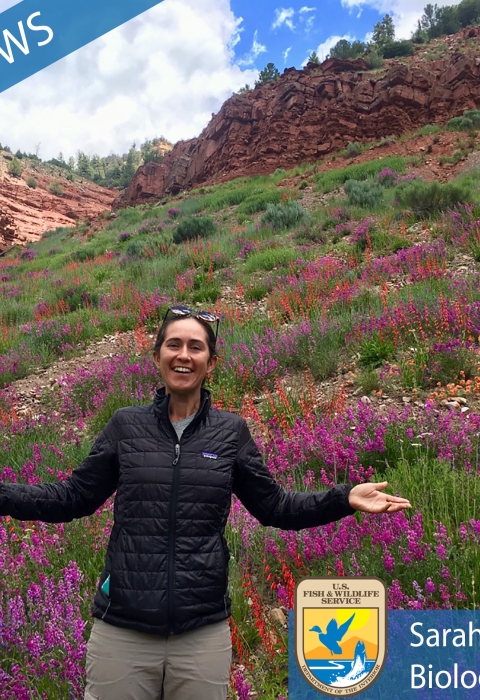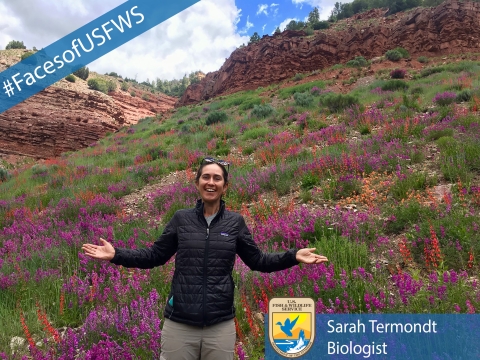By Olivia Beitelspacher, public affairs specialist
Meet one of our newest biologists Sarah Termondt! Sarah discusses how she discovered her passion for biology and the incredible work she has done both domestically and abroad. Learn more in our latest Faces of the U.S. Fish and Wildlife Service interview.
Olivia Beitelspacher: Hi Sarah, welcome to the U.S. Fish and Wildlife Service! What role do you play within the agency?
Sarah Termondt: I’m a biologist that will be assisting with Section 7 Section 7
Section 7 Consultation
The Endangered Species Act (ESA) directs all Federal agencies to work to conserve endangered and threatened species and to use their authorities to further the purposes of the Act. Section 7 of the Act, called "Interagency Cooperation," is the mechanism by which Federal agencies ensure the actions they take, including those they fund or authorize, do not jeopardize the existence of any listed species.
Learn more about Section 7 Consultation work.
OB: Where did you go to school and what did you study?
ST: I studied at University of California San Diego and my degree is in Environmental Science – Ecology, Behavior, and Evolution.
OB: That’s great! Can you tell us what led you to a career with the U.S. Fish and Wildlife Service?
ST: I grew up in Ojai, playing in the creeks and hiking the Los Padres National forest. It’s a pretty special place to get to experience childhood and it taught me to love being outside. After a few botany classes and a study abroad in Costa Rica, I was hooked on field biology. I’ve worked as a private consultant and researcher doing botanical and wildlife survey work throughout southern California and during the course of my career I’ve seen many resources face increasing anthropogenic pressures. Consequently, I feel very happy to have been able to join the USFWS team to direct my life’s work towards helping conservation and recovery efforts. I also have some former government work experience – I served as a Peace Corps Volunteer from 2009-2012 in the Dominican Republic working in the environmental sector.
OB: Wow! I think it’s very cool that after all of the amazing experiences you had abroad that you were able to come back to the Ventura area where it all began. Feels very full-circle! Do you have a conservation hero or mentor?
ST: A former mentor, the late Patricia Ortiz, who I feel extremely fortunate to have been able work with in Monteverde, Costa Rica. While traveling the country-side in hopes of understanding climate change climate change
Climate change includes both global warming driven by human-induced emissions of greenhouse gases and the resulting large-scale shifts in weather patterns. Though there have been previous periods of climatic change, since the mid-20th century humans have had an unprecedented impact on Earth's climate system and caused change on a global scale.
Learn more about climate change ’s effect on the phenology of Coffea arabica (as well as enjoying cups of it), she kindled a recently ignited flame that plant taxonomy sparked in me. She inspired a generation of students to notice, love, and protect biodiversity. Many of my former field team-members as well as my Nana (who was an avid birder) were also hugely influential to me.
OB: That must have been a truly special experience. I’m so glad you have had such inspirational people in your life! Is there a particular project from your career or schooling that makes you really proud?
ST: I’m very proud of ongoing work with the Santa Barbara Botanic Garden’s rare plant conservation team involving outreach, research, and conservation efforts for a number of imperiled plant species. I also feel quite lucky to have been able to participate in research involving how long-term noise pollution may be affecting seedling recruitment rates and plant community composition with a team at Cal Poly San Luis Obispo. I’ll also say I’m pretty tickled that my little chess club I started in the Dominican Republic through Peace Corps is still rocking it!
OB: What a diverse array of projects! And so glad to hear the chess club is alive and well! Speaking of chess, what activities do you like to do in your free time?
ST: Recently, my partner and I have been enjoying finding and learning all things mycological. We really enjoy biking, kayaking, and hiking. I dabble in wood-working and love projects where I can find disposed material and repurpose it. I love gardens and my kitchen (where I have a fermentation station).
OB: You certainly know how to keep busy and have fun! I’ll have to come to you for some hiking trail recommendations. Okay, last question: do you have a hidden talent?
ST: I can play many musical instruments – if you ever bring one to me, I’ll do my best to play a tune for you.
OB: I can’t wait to hear you play!




